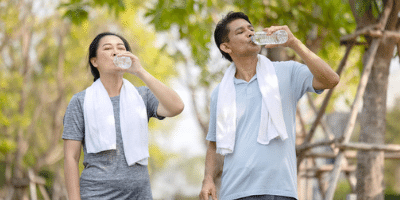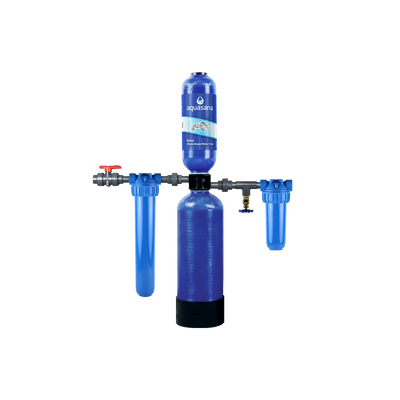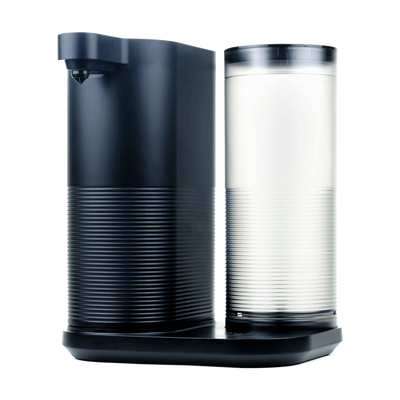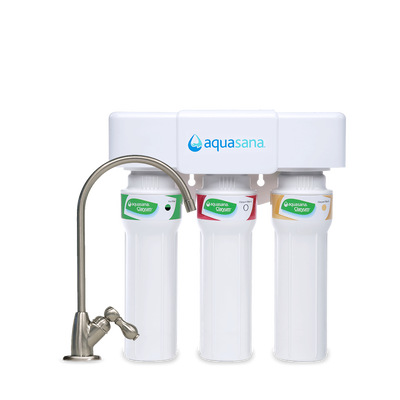UNDER SINK WATER FILTER
SmartFlow® Reverse Osmosis
High-efficiency reverse osmosis system removes up to 99.99% of 90 contaminants, including fluoride, arsenic, chlorine, and lead.
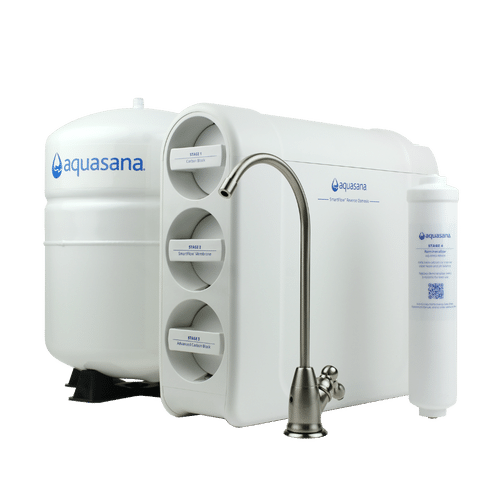
Health benefits of hydration
Ensuring proper hydration comes with a multitude of health benefits that extend beyond simple thirst quenching and can increase your longevity. Here are a few:
- Healthy Skin: Since our skin is the largest organ in the body, and the one organ we can see, it’s important to drink water to retain its strength and elasticity.
- Maintaining a Healthy Weight: Studies show that water can help with weight loss by boosting metabolism, suppressing appetite, and making exercise easier and more efficient.
- Brain Function: Water accounts for 75% of brain mass. That water in the brain helps clear out toxins and waste that can impede brain function, carry nutrients to keep your brain healthy, and help brain cells communicate with one another. Dehydration can cause brain fog and slow the brain’s reaction time. Studies show that you only need to be 1% dehydrated to experience a 5% decrease in cognitive function.
- Increased Energy Levels: Staying well-hydrated boosts energy, promoting activity, alertness, and physical strength.
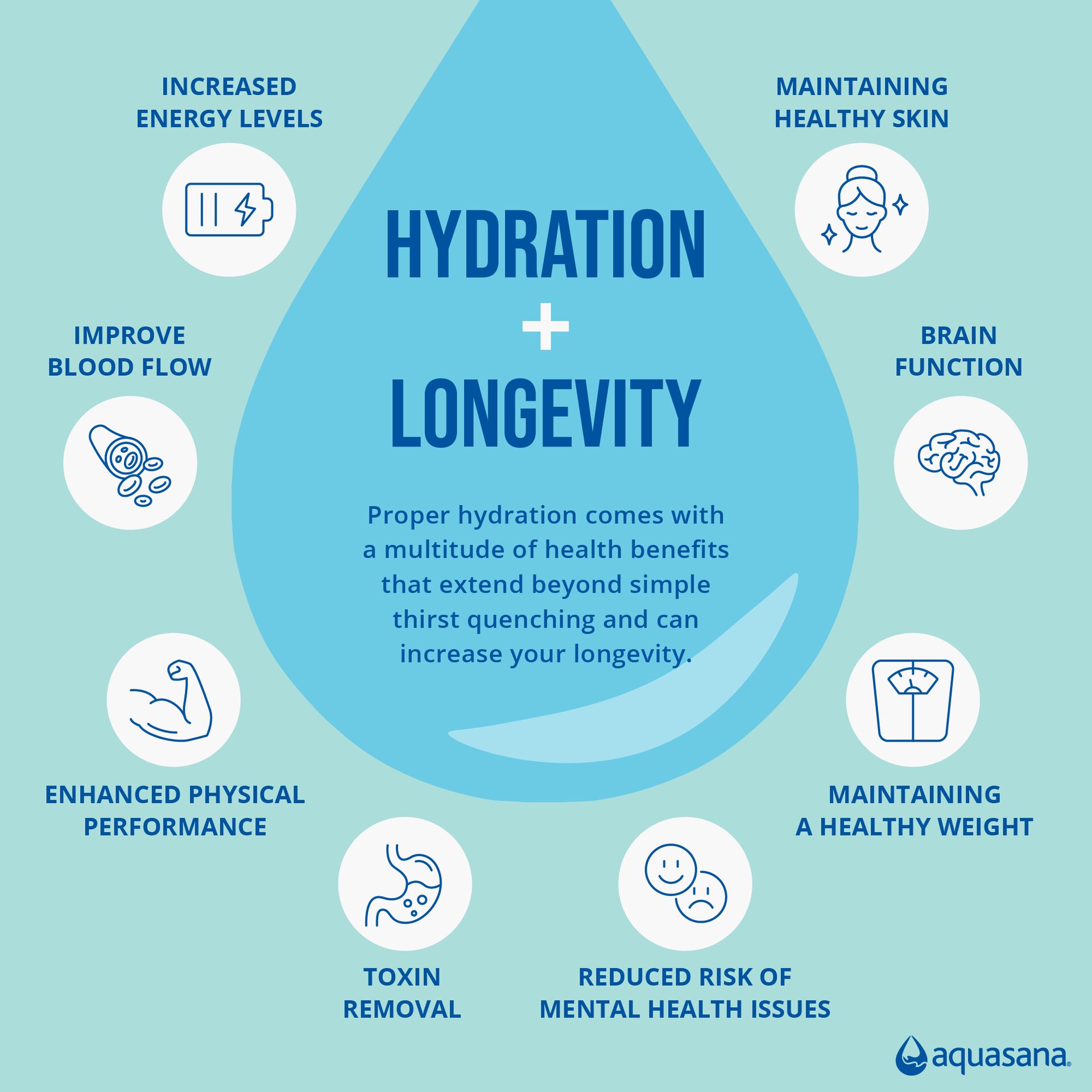
- Improved Blood Flow: Hydration is crucial to blood circulation, and increased blood flow benefits brain health, heart function, and overall wellness.
- Enhanced Physical Performance: Proper hydration helps prevent injuries by maintaining optimal muscle function and joint lubrication during physical activities.
- Toxin Removal: Adequate fluid intake aids in flushing out toxins from the body acquired through daily consumption of food and medications.
- Reduced Risk of Mental Health Issues: Proper hydration contributes to a lower risk of anxiety and depression, supporting overall mental well-being.
How much water should you drink to increase your longevity?
The average adult needs between 2.7 to 3.7 liters of water each day, or about 11-15 cups, according to the U.S. National Academies of Sciences, Engineering, and Medicine. But, the amount of water each person needs in order to be healthy varies from person to person based on factors like gender, age, climate, and overall health status. For example, if you’re someone who exercises often or lives in a hot, humid climate, you’ll probably need to drink more water to account for the fluids lost during your workout or through general sweating. It’s important to remember as well that dehydration can also be a result of high altitudes, as there is an apparent link between fluid retention and high altitudes. Another example is if you’re sick with a fever, diarrhea, or a urinary tract infection, you’ll need to increase your water intake as these conditions draw — or purge — fluid and electrolytes from your body, making you more susceptible to dehydration.
How to tell if you’re not hydrated enough
While staying hydrated can boost your health and longevity, being dehydrated can have some pretty serious consequences. Thirst isn't always a reliable early indicator of the body's need for water. Many people, particularly older adults, don't feel thirsty until they're already dehydrated. Here are some signs you’re not drinking enough water:
- You feel thirsty
- You’re more tired than normal
- Dizziness
- Frequent headaches
- Muscle cramps
- Dry skin
- Dry mouth, lips, and tongue
- Peeing less often than usual
- Dark-colored, strong-smelling urine
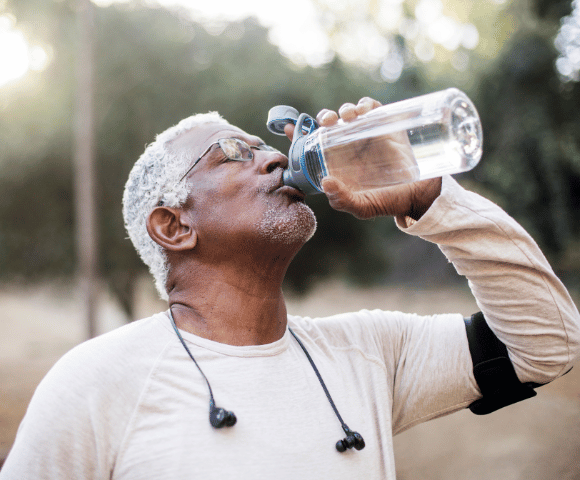
Tips for staying hydrated to live a long and healthy life
From boosting energy levels and promoting mental well-being to supporting vital organ functions and aiding in detoxification, staying properly hydrated is a cornerstone of overall health. While drinking a certain number of glasses of water each day provides a practical starting point, it's crucial to recognize that individual hydration needs vary based on factors like age, gender, and overall health. Striking a balance and paying attention to your body's signals, such as thirst and urine color, are vital aspects of maintaining optimal hydration.
Here are a few tips for staying hydrated, and you can read more in our 7 Tips to Drink More Water post:
- Keep a Water Bottle Handy: Not only are you more likely to drink water when it’s right next to you, but using a reusable water bottle reduces plastic waste and lowers your environmental impact.
- Choose Filtered Water: If your home’s water tastes or smells bad, it’s no wonder you’re hesitant to fill up. By filtering your water, it not only will taste and smell better, but potentially harmful contaminants will be reduced, as well.
- Add Flavor to Your Water: Sometimes drinking plain water can be boring. Don’t hesitate to add flavor to your water by infusing it with fruit or adding natural flavor drops. Not only will your water be more flavorful, but the fruit can add important vitamins and antioxidants to boost nutrition.
The water you drink matters
The quality of the water we consume is just as important as the quantity. Ensuring that the water we drink is free from contaminants is an essential step toward better health. Aquasana’s whole house, countertop, and under sink systems can help you on your journey to staying hydrated with better water. Filtering your water not only enhances its taste, but also removes potentially harmful impurities, contributing to your overall well-being. With multiple models to choose from to suit your needs, Aquasana’s filtration systems provide contaminant removal for delicious water that’s rich in beneficial minerals.
Shop Aquasana’s selection of water filters for refreshing water today!
